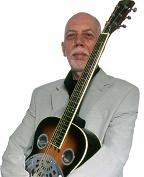

|
From the beginning of Lindisfarne to his current solo album Odd Man Out, the career of Rod Clements reads like a whoís who of contemporary British folk roots. After three decades in the business spanning over thirty albums and several chart hits, Rod Clements is 'a man emerging from the Lindisfarne years and carving his own unique furrow in inimitable style' (BBC Radio Scotland). Rodís latest album shows him to be a consummate artist who has never rested on his laurels, either as a songwriter or as a live performer, and whose future is assured as 'a cult artist in the making' (Simon Jones). |
Back home in North Shields, Rod teamed up with local musicians to form a blues band (also called the Downtown Faction), whilst moonlighting as bassist with a show band backing strippers and comedians on the notorious Tyneside club circuit. Rodís growing interest in country blues and slide guitar, and his early attempts at songwriting, led him to the folk clubs where he and a stripped-down version of the Downtown Faction, now known as Brethren, played Woody Guthrie and Leadbelly songs alongside their own embryonic efforts.
The Tyneside folk clubs of the late 60s were a thriving scene which brought Rod into contact with some of the leading names of the day like Billy Connolly, Gerry Rafferty, Ralph McTell, Al Stewart, Rab Noakes and many more. Most significantly for Rod and his mates, they fell in with a Newcastle singer/songwriter called Alan Hull with whom they went on to form the classic folk-rock band Lindisfarne.
Though Alan was Lindisfarneís principal songwriter, it was Rod who provided the band with its first hit in Meet Me On The Corner which reached the top 5 in March 1972, won Rod a Certificate of Honour at the Ivor Novello awards, and paved the way for the bandís chart-topping Fog On The Tyne album. Over thirty years on, Meet Me On The Corner still gets regular radio play, and instantly evokes its time, as when it was recently used by the makers of the BBC-TV drama Life On Mars.
During Lindisfarneís long career, Rod gave the band many much-loved album tracks and stage favourites like Road To Kingdom Come and Train in G Major. Following Alan Hullís untimely death in 1995 Rod became the bandís main songwriter who, in partnership with producer & co-writer Nigel Stonier, provided the bulk of the material for Lindisfarneís two last critically acclaimed albums Here Comes The Neighbourhood and Promenade. Rodís contributions to the bandís distinctive sound ranged from full-time bass player (a role he relinquished in 1990) to fiddle, mandolin, dobro and electric slide guitar, and Ė increasingly in later years Ė vocals.
Rod was also a founding member of Jack The Lad, the Lindisfarne spin-off band, in whose debut album Itís Jack The Lad he played a significant role as multi-instrumentalist and songwriter.
Rodís instrumental skills have been in demand from early in his career and he has contributed to the work of some of the greatest names in folk & roots music. In 1974 he played bass on one the British folk sceneís biggest hits and best-loved classics, Ralph McTell's Streets Of London, which topped the charts at Christmas that year. Rod went on to tour and record several albums with Ralph.
The McTell connection led directly to Rodís involvement with one of his guitar heroes and arguably the most influential guitarist of his generation, Bert Jansch. Rod and Bert worked closely through 1975-6, sharing a house in North London, touring Britain and Europe and recording Bertís comeback album A Rare Conundrum (produced by Rod) for the Charisma label.
Bert and Rod worked together occasionally throughout the 80s. The recording in Newcastle of a Woody Guthrie tribute album (Woody Lives!) led to the jointly credited Leather Launderette (Bert Jansch & Rod Clements) and two nationwide tours, which saw Bert & Rod returning to their folk-club roots. Bert, in turn, recruited Rod into a reformed Pentangle, with whom Ė stepping into John Renbournís shoes Ė he toured Britain, Europe and the U.S.A. and recorded an album, So Early In The Spring.
Rod has also toured and recorded extensively with such seminal figures as Michael Chapman and Rab Noakes, and contributed to albums by Peter Hammill (ex-Van Der Graaf Generator), Wizz Jones and celebrated Northumbrian piper Kathryn Tickell amongst many others. He has supplied bass, dobro and guitar parts to albums by highly-rated singer-songwriter Thea Gilmore, who has returned the favour by providing vocals on Rodís recent solo albums.
Rod's songs have been covered by artists as diverse as Melanie and Joe Brown and a Clements/Stonier composition, Canít Do Right For Doing Wrong, was a much-played top 40 hit for Erin Rocha at Christmas 2003.
In recent years Rod has broken cover as a solo artist. Surprising many who previously knew him only as a background figure in Lindisfarne, Rod released his Stamping Ground album in 2000. Combining quality new songs in a broad rootsy style, Rod's vocal and guitar skills fronted a band including ex-Lindisfarne colleagues Dave Hull-Denholm and Ian Thomson, , former Long Ryder Sid Griffin, ex-10cc drummer Paul Burgess and Thea Gilmore on vocals. The result won widespread critical acclaim.
Rod's latest album Odd Man Out follows on from Stamping Ground and again features Thea Gilmore's vocals complementing Rod's own. Produced and partly co-written by Nigel Stonier, the songs reveal the strength of Rodís commitment to his craft, an individual voice in an increasingly homogenised world, and a readiness to meet the future on his own terms.
|